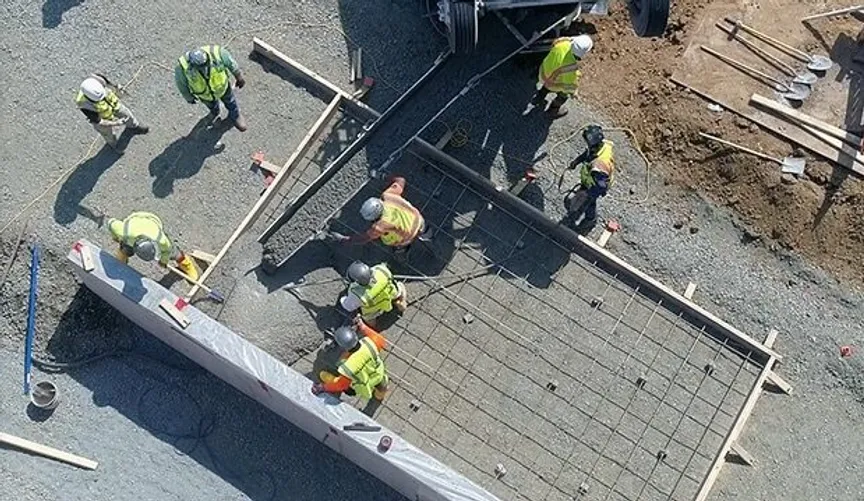
Earlier this week, two low-carbon cement startups unveiled new partnerships with data-center developers and operators, which are looking at ways to curb the tech sector’s ballooning climate impact.
The separate announcements from Sublime Systems and Brimstone are a striking example of how businesses are pressing ahead with efforts to decarbonize essential polluting industries like cement making — even as the Trump administration guts federal programs meant to kick-start U.S. manufacturing of cleaner construction materials.
Both companies are developing novel ways of producing cement that don’t cook the planet in the process. Cement — the gluey powder mixed with sand, gravel, and water to form concrete — is responsible for roughly 8% of global carbon dioxide emissions. Nearly all cement is made today by heating carbon-rich limestone in fossil-fuel-burning kilns.
Sublime, an MIT spinout, said on Tuesday that it completed a “pilot pour” of its fossil-fuel-free cement at a data center campus in northern Virginia owned by Stack Infrastructure. Sublime’s approach involves electrically charging a bath of chemicals and calcium silicate rocks. In Virginia, the startup and its partners used the cement to make seven cubic yards of concrete mix, which was then spread over a high-traffic loading dock.
Demonstration projects like these are key to convincing the inherently cautious construction industry to embrace new approaches. “It gives us a proof point to then [do] larger-scale deployments in a few years,” Cory Waltrip, Sublime’s director of business development and strategy, told Canary Media.
Those future deployments could include facilities run by Microsoft. The tech giant recently signed a binding deal to purchase up to 622,500 metric tons of Sublime’s cement products — enough to build roughly 30 professional football stadiums — from the startup’s forthcoming manufacturing facilities. The agreement marks a massive step up for Sublime, which can currently make just 250 metric tons of cement per year at its pilot plant in Somerville, Massachusetts.
Brimstone, for its part, also announced on Tuesday that it signed a commercial agreement with Amazon. The deal allows Amazon, valued at $2 trillion, to reserve future supplies of Brimstone’s low-carbon cement, though the partners declined to provide more specific details.
Oakland, California–based Brimstone sources carbon-free rocks instead of limestone, then pulverizes those rocks and adds chemical agents to leach out valuable minerals. Certain compounds are heated in a rotary kiln to make industry-standard cement. What remains can be used as supplementary cementitious materials — which help bulk up cement mixes — or to make a key component of aluminum.
Cody Finke, Brimstone’s co-founder and CEO, said Amazon began testing Brimstone’s products about a year ago and found they worked just as well as the conventional materials used in Amazon’s buildings. Amazon will get its supply from Brimstone’s $378 million commercial demonstration plant, which is slated to be operating by the end of the decade, Finke said.
The announcements send an important signal that private-sector demand isn’t waning for cleaner construction products — despite the White House abandoning strategies and rescinding funding for using greener cement, steel, glass, and other materials in public buildings, roads, and bridges.
Melissa Hulting, director for industrial decarbonization at the Center for Climate and Energy Solutions, said she was “really excited” about the latest news from Sublime and Brimstone.
“In the absence of federal demand … it’s great to see that companies are stepping in and supporting procurement” of low-carbon cement, she said. “I’m hoping that we’ll see more companies, especially with the building up of these data centers, come in and fill that void.”
Still, green cement startups continue to face a sizable challenge in scaling up their pioneering manufacturing plants. The task is likely to be even harder now that the Department of Energy has clawed back crucial funding for industrial decarbonization initiatives.
In late May, the DOE said it was canceling over $3.7 billion in awards for two dozen projects aimed at decarbonizing everything from cement kilns and glassmaking furnaces to mac-and-cheese factories and whiskey distilleries. Sublime was slated to get up to $87 million to build its commercial-scale cement facility in Holyoke, Massachusetts. Brimstone had been awarded up to $189 million to finance the construction of its commercial plant, the site for which is still being decided.
Both Sublime and Brimstone said they’re in ongoing conversations with the DOE to try to appeal the decision. In the meantime, however, the startups are moving forward as planned with their manufacturing facilities.
Finke said Brimstone’s award cancellation felt like an “oversight, because critical materials are such an important topic for the Trump administration.” But he said that losing the federal funding doesn’t affect the company’s long-term strategy, which is focused on raising private capital. To date, the six-year-old startup has raised over $80 million from investors.
Sublime, meanwhile, has raised over $200 million since its founding in 2020, a figure that includes the DOE award. Leah Ellis, Sublime’s co-founder and CEO, said the startup remains on track to begin delivering cement to Microsoft and other customers from its Holyoke facility in 2028.
“We do think what we’re doing is aligned with the current administration’s priorities of creating jobs and investing in modernizing and onshoring manufacturing of important materials,” she said.
“Everything inside Sublime is going as well as we could hope,” Ellis added. “Nobody thought that scaling up a new cement technology would be easy, right? But that’s what we’re here for.”